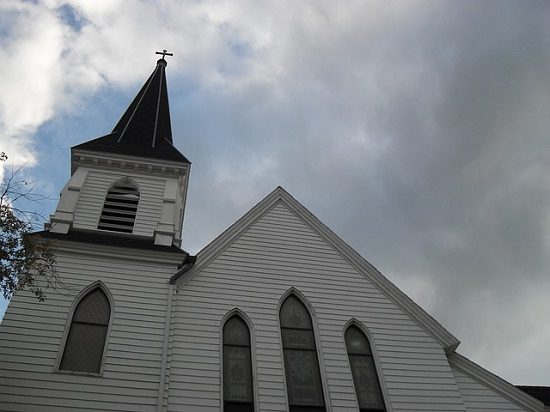You Tube Video: “Phony Pat Robertson” (6 August 2013) ***
I am as Catholic as any Catholic is. I wholeheartedly accept all that the Church teaches, and have devoted my life to defending Holy Mother Church (full-time for the last eleven years). No one can tar me as some sort of “liberal” in objecting to this video, or claim that I have “Protestant leftovers” in my belief-system. Don’t even try; don’t even start.
That said (and it should be utterly unnecessary), the anti-Protestantism that Voris exhibits here is dead-set against Vatican II: the ecumenical council that dealt most in-depth with ecumenism and the nature of our relations with Protestant separated brethren: fellow Christians, after all, who are validly baptized, validly and sacramentally married (in the case of two baptized lifelong Protestants who are married in a Protestant service) and partake of many other graces and share a great deal in common with us.
As a former Protestant, I know what was in my heart, what I believed and didn’t believe. I don’t recognize myself at all in these absurd word-pictures that Voris creates. Nor do, I’m sure, the vast majority of those converts to the Church who used to be Protestants (nor, of course, Protestants themselves). Let’s take some of the egregious examples from the video:
0:45 Are you looking for a reason or demonstration of why the Protestant heresy has been so harmful to the western world, and been the ultimate reason why the entire civilization has come crashing down? Well, all you have to do is listen to Pat Robertson . . .
Protestantism is the ultimate reason, huh? Nothing else factors in there; our fellow Christians have accomplished such a mighty feat all on their own! I wrote in a paper back in 2000, in response to RadCathRs, the following cultural observation, that also fits here:
. . . elements of the Renaissance and the earlier nominalism, the Enlightenment, materialistic evolutionism, the utopian ideal of Progress, massive secularization, Marxism, philosophical relativism, political and theological liberalism, the Sexual and Feminist and Unisex Revolutions, idolatrous wealth and all the myriad temptations of modern American life, the disintegration of the family, the incessant propaganda and brainwashing of TV and movies and advertising, lack of education . . .
Theological liberalism / secularism / atheism in particular attacked all forms of Christianity in the 18th and 19th centuries. Protestantism can hardly have been the cause of all that, when it was as vigorously opposed by these forces of darkness as the Catholic Church was. Blessed John Henry Cardinal Newman, in his “Biglietto” speech upon becoming a Cardinal (12 May 1879), placed atheism and “religion” in opposition to each other, not atheism and Catholicism only:
Hitherto the civil power has been Christian. Even in countries separated from the Church, as in my own, the dictum was in force, when I was young, that: ‘Christianity was the law of the land.’ Now, everywhere that goodly framework of society, which is the creation of Christianity, is throwing off Christianity. The dictum to which I have referred, with a hundred others which followed upon it, is gone, or is going everywhere; and, by the end of the century, unless the Almighty interferes, it will be forgotten. Hitherto, it has been considered that religion alone, with its supernatural sanctions, was strong enough to secure submission of the masses of our population to law and order; now the Philosophers and Politicians are bent on satisfying this problem without the aid of Christianity.. . . As to Religion, it is a private luxury, which a man may have if he will; but which of course he must pay for, and which he must not obtrude upon others, or indulge in to their annoyance. The general [nature] of this great apostasia is one and the same everywhere; but in detail, and in character, it varies in different countries. For myself, I would rather speak of it in my own country, which I know. There, I think it threatens to have a formidable success; though it is not easy to see what will be its ultimate issue. At first sight it might be thought that Englishmen are too religious for a movement which, on the continent, seems to be founded on infidelity; but the misfortune with us is, that, though it ends in infidelity as in other places, it does not necessarily arise out of infidelity. . . . it must be borne in mind, that there is much in the liberalistic theory which is good and true; for example, not to say more, the precepts of justice, truthfulness, sobriety, self-command, benevolence, which, as I have already noted, are among its avowed principles, and the natural laws of society. It is not till we find that this array of principles is intended to supersede, to block out, religion, that we pronounce it to be evil. There never was a device of the Enemy so cleverly framed and with such promise of success.(Wilfrid Ward, The Life of John Henry Cardinal Newman, London: Longmans, Green, and Co., 1912, Vol. II, 460-462)
Voris refers in blanket terms to “the Protestant heresy.” Yes, in several ways, the various sects of Protestantism are indeed heretical. Yet Protestantism is also Christian. It’s not simply a heresy and 100% false. Here is how Vatican II refers to Protestants, in its Decree on Ecumenism (Unitatis Redintegratio, 21 November 1964) [all emphases mine]:
among our separated brethren also there increases from day to day a movement, fostered by the grace of the Holy Spirit, for the restoration of unity among all Christians. Taking part in this movement, which is called ecumenical, are those who invoke the Triune God and confess Jesus as Lord and Saviour. They do this not only as individuals but also as members of corporate groups in which they have heard the Gospel . . . The sacred Council gladly notes all this (1)
. . . one cannot charge with the sin of separation those who at present are born into these communities and in them are brought up in the faith of Christ, and the Catholic Church accepts them with respect and affection as brothers. For men who believe in Christ and have been properly baptized are put in some, though imperfect, communion with the Catholic Church. (3)
all who have been justified by faith in baptism are incorporated into Christ [footnote cites Council of Florence, Session 8, from the year 1439]; they therefore have a right to be called Christians, and with good reason are accepted as brothers by the children of the Catholic Church. (3)
Moreover, some, even very many, of the most significant elements and endowments which together go to build up and give life to the Church itself, can exist outside the visible boundaries of the Catholic Church: the written Word of God; the life of grace; faith, hope and charity, with the other interior gifts of the Holy Spirit, as well as visible elements. All of these . . . come from Christ and lead back to him . . . (3)
The brethren divided from us also carry out many liturgical actions of the Christian religion. In ways that vary according to the conditions of each Church or community, these liturgical actions most certainly can truly engender a life of grace, and, one must say, can aptly give access to the communion of salvation. (3)
the separated Churches and communions as such . . . have been by no means deprived of significance and importance in the mystery of salvation. For the Spirit of Christ has not refrained from using them as a means of salvation which derive their efficacy from the very fullness of grace and truth entrusted to the Catholic Church. (3)
Catholics must gladly acknowledge and esteem the truly Christian endowments for our common heritage which are to be found among our separated brethren. It is right and salutary to recognize the riches of Christ and virtuous works in the lives of others who are bearing witness to Christ, sometimes even to the shedding of their blood. (4)
Nor should we forget that anything wrought by the grace of the Holy Spirit in the hearts of our separated brethren can contribute to our own edification. Whatever is truly Christian is never contrary to what genuinely belongs to the faith; indeed, it can always bring a more perfect realization of the very mystery of Christ and the Church. (4)
bond of brotherhood existing among all Christians. (5)
All this, and all Voris can say about our Protestant brethren in Christ is that the entire group is a “heresy” that has “been the ultimate reason why the entire civilization has come crashing down”?
I don’t think so. He either accepts Vatican II as magisterial Catholic teaching or he does not. If he accepts Trent, he must also accept Vatican II, which according to Pope Benedict XVI in his pre-pontificate interview, The Ratzinger Report, “is upheld by the same authority as Vatican I and the Council of Trent, namely, the Pope and the College of Bishops in communion with him.” He continued:
Whoever accepts Vatican II, as it has clearly expressed and understood itself, at the same time accepts the whole binding tradition of the Catholic Church, particularly also the two previous councils . . . It is likewise impossible to decide in favor of Trent and Vatican I but against Vatican II. Whoever denies Vatican II denies the authority that upholds the other two councils and thereby detaches them from their foundation. And this applies to the so-called ‘traditionalism,’ also in its extreme forms. Every partisan choice destroys the whole (the very history of the Church) which can exist only as an indivisible unity. To defend the true tradition of the Church today means to defend the Council.
I have also documented that the term “separated brethren” preceded Vatican II by 68 years: going back to Pope Leo XIII.
We make our choice. It’s with the pope and Vatican II (including ecumenism), or with Voris and against pope, council, and ecumenism. I will always follow the pope and Holy Mother Church. How about you?
1:32 . . . Robertson, in typical Protestant fashion (meaning, an answer made up in thin air, based on nothing other than his own feelings and opinions and misreading of Sacred Scripture) . . .
Any Protestant, former Protestant, and even almost all folks who have never been Protestant, but know Protestants or have read Protestant literature, instantly know how silly this is. He doesn’t even qualify it by saying “some Protestants . . . ” No, for the “black-and-white” Voris, this is “typical Protestant” behavior. It’s classic prejudice and bigotry.
4:43 . . . and this is why, forty plus years later, abortion is still going strong: the Protestant poison of birth control, that huge numbers of Catholics have unfortunately consumed as well . . .
More stereotyping . . . Voris himself notes how Protestantism uniformly rejected contraception until the Anglicans first allowed it in 1930. Both Martin Luther and John Calvin strongly spoke out against it as murder, as I have documented. It obviously originated from outside of any strain of Christianity. The contraceptive anti-child mentality came from ancient pagan Greek and Roman culture (hence, the Church fathers spoke out against it). Later, it was seen in occultic and heretical circles; then at long last in the 18th-century so-called “Enlightenment” leading directly to the modernist / liberal rejection of orthodox theology and outright skepticism and atheism.
These modernist strains continuing into the early 20th century clearly influenced the Anglicans (who were already markedly liberal in theology). Then the final blow came in the 1960s with the sexual revolution (again, not inherent in classical Protestantism, but coming from outside of it, hearkening back to pagan sexual license). How is all that to be construed as “Protestant”?
My friend Michael Forrest, commenting on this, wrote:
John Rock, a Catholic, invented the birth control pill. (Ironically, his intention was reportedly to comply with Church teaching, but he was still wrong.) He campaigned for Catholic approval of the pill. He published a book, The Time Has Come: A Catholic Doctor’s Proposals to End the Battle over Birth Control, and was featured by Time and Newsweek. He also gave numerous interviews with the networks. Catholic priests, theologians [and bishops] effectively defected from the faith over this issue and treated Humanae Vitae [in 1968] as DOA. [see more on that]
The bishops didn’t have the knowledge or fortitude to stand. Catholics led the way on “the pill” and when presented with “Peter’s” teaching rejected it. That’s obviously not the fault of Protestants who do not have Peter. If anything, I would say that Catholics are most to blame for society embracing contraception. We should have known better. We had the teaching. We had Peter. We had the One True Church. We didn’t care.
6:56 If you listen closely to Protestantism, you won’t have to listen long, before you discover that sooner or later, it pulls you away from our blessed Lord and His truth.
Wow. I merely need to appeal to the statements above from Vatican II, which are diametrically opposed and contrary to these. I grew and flourished in Protestant evangelical circles, and learned much of what I believe now. Meanwhile, millions have languished in Catholic parishes where liberals hold sway, as Voris himself has often talked about. It’s impossible to paint such a simplistic, black-and-white scenario.
Make your choice. With high and tragic irony, Voris disses and belittles Protestants for rejecting the Catholic Church and system, yet he turns around and thumbs his nose at that same system, by rejecting Vatican II where he selectively chooses what he will accept and not accept (the “pick-and-choose” mentality of the liberal / modernist / dissident, and also of the Protestant rule of faith, private judgment).














